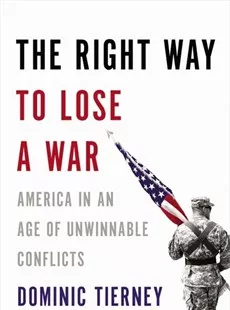Political Scientist Dominic Tierney Examines America in Age of Unwinnable Conflicts
Why has the United States stopped winning wars? When a conflict turns into an unwinnable quagmire, how can Washington get out without compromising the nation's deepest values?
In his new book The Right Way to Lose a War, Associate Professor of Political Science Dominic Tierney tries to answer the questions that have puzzled U.S. presidents for decades.
Combining battlefield stories with advice from dozens of top generals and policymakers — including Stanley McChrystal, John Allen, George Casey, Ryan Crocker, and George Schultz — Tierney explains why the United States is struggling on the battlefield, how Washington can resolve a failing war, and how America can start winning again.

Listen to Dominic Tierney's appearance on RadioTimes and read an excerpt of the book at The Atlantic. His book is also discussed in The National Review.
Following his critically acclaimed book How We Fight: Crusades, Quagmires, and the American Way of War, Tierney was interested in examining American policies in "an age of seemingly endless military quagmires."
"Korea, Vietnam, Afghanistan, and Iraq represent a string of stalemates and defeats. Why does the United States keep losing wars? How can we handle the toughest crisis of all— battlefield failure? Can we return to the path of victory?" he asks. "These questions are incredibly important for the lives of thousands of U.S. soldiers, for the future of countries like Afghanistan and Iraq, for domestic politics at home, and for the careers of presidents."
Tierney also has a personal connection at the heart of the book.
"My great grandmother's first husband was a British soldier in World War I. He somehow survived almost the entire campaign, before being killed during the final months in 1918. He died because the combatants were trapped in a war they couldn't end."
Tierney says that for a century – until the end of World War II in 1945 – the United States won nearly every major military campaign it fought. And then just when the United States received the laurels of triumph and became the unsurpassed superpower in 1945, it stopped winning wars.
"After 1945, American power created a constant temptation to use force and projected U.S. forces into distant quarrels," he says. "But the nature of warfare changed. Conflicts became increasingly dominated by civil wars. As a result, the United States waded into far-flung guerrilla conflicts in culturally alien societies we didn't understand. "
He adds that since 1945, the U.S. has been good at getting in and bad at getting out of wars, noting that it took 21 days to capture Baghdad in 2003 and 3,174 days to leave. "We seized Kabul in November 2001—and we're still there," he adds.
"One problem is that presidents go to war sure of victory and neglect to plan for the possibility of failure," says Tierney. "When disaster strikes, Washington is completely unprepared. The aftermath of battlefield disaster is an incredibly difficult environment to navigate—in terms of human psychology, public support, and alliance politics."
So what should Washington do if a war becomes unwinnable—like Korea, Vietnam, Iraq or Afghanistan? Tierney outlines a strategy called surge, talk, and leave.
"At the moment, we wait until military disaster strikes and then desperately try to cobble together a withdrawal plan. In other words, we build a fire escape after the blaze has already started. Instead, we should construct a fire escape before the inferno begins," he says. "After battlefield failure, Washington should temporarily boost U.S. capabilities to avert a military rout, negotiate with the opponent, and find a responsible way to withdraw most American soldiers."
Tierney believes that President Obama has broadly followed a surge, talk, and leave strategy in Afghanistan, but adds that he does not think Obama has a plan for the endgame, or a way to achieve enduring success, in the current fight against ISIS.
Additionally, Tierney says that American decision-makers can cut down on unwinnable conflicts by making war safe, legal, and rare.
"Safe means we prepare for the kind of wars we're actually going to face, especially nation-building and counter-insurgency missions. Legal means we fight according to the rules: gaining congressional approval, building multilateral support, and upholding the rule of law on the battlefield. Rare means we fight fewer wars. By making war safe, legal, and rare, we can start fewer military operations and raise the odds of success."
Tierney, a senior fellow at the Foreign Policy Research Institute, is a contributing editor at The Atlantic and the author of three additional books, including How We Fight: Crusades, Quagmires, and the American Way of War. Tierney completed his Ph.D. in international politics at Oxford University in 2003 and was a post-doctoral fellow at the Mershon Center at Ohio State University and the Olin Institute at Harvard University before coming to Swarthmore in 2005. In 2008-2009, he was a research fellow at the John F. Kennedy School of Government at Harvard.



